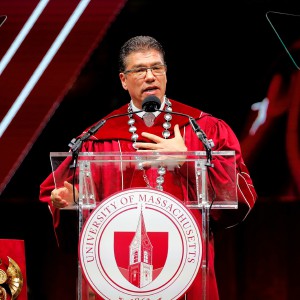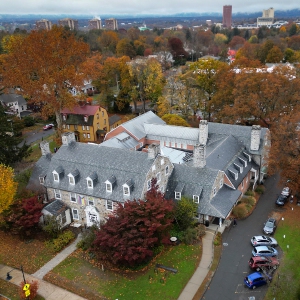Rural issues on a global stage: Renowned climate justice activist Flowers gives keynote at UMass for Black History Month
| Published: 03-10-2024 1:52 PM |
AMHERST — Before acclaimed environmental activist Catherine Coleman Flowers said one word about herself at the outset of a talk at UMass on Feb. 29, she expressed gratitude to marginalized communities across the country who trusted her to share their stories.
Without the people of Jackson, Mississippi, or Laos County, Alabama, Flowers said she wouldn’t have learned about the lack of sewer infrastructure across the country or led a study in the South that uncovered evidence of tropical parasites such as hookworm and toxocara in the United States.
Without people in those communities, she wouldn’t have been awarded the MacArthur Fellowship in 2020, traveled to Dubai for COP28, the United Nations climate conference late last year, or served as vice chair of the White House Environmental Justice Advisory Council in 2021.
And without them, it may have been someone else standing before dozens of administration, students, professors and community members in the UMass Student Union Ballroom and giving this year’s keynote speech for Black History Month.
In her 90-minute speech, Flowers explained how she earned the trust of people in marginalized communities, and has been able to amplify their unrecognized experiences thorough books, speeches and events as a way to open the door to improving their living conditions.
She also highlighted how the combined experiences shared by older members of communities and the innovations from the young are the keys to fighting injustice and climate change.
“I speak to young people because we’re going to have to innovate ourselves out of the hill that we have put ourselves into,” Flowers said. “It is incumbent upon you, who can think out of the box, to innovate us out of this. Because what we have now is not working and it’s failing everywhere.”
Flowers first learned about the porous condition of sewer infrastructure when she returned to her childhood home of Laos County in 2000 to encourage building economic infrastructure and wealth in her community. When she started reaching out to local residents, her neighbors and friends told her about the county’s failing sewer infrastructure, and the ways extreme weather intensified by climate change, bringing rainstorms, tornadoes and hurricanes, further exacerbated these failures.
Article continues after...
Yesterday's Most Read Articles
 Granby Bow and Gun Club says stray bullets that hit homes in Belchertown did not come from its range
Granby Bow and Gun Club says stray bullets that hit homes in Belchertown did not come from its range
 Super defers Amherst middle school principal pick to successor; one finalist says decision is retaliation for lawsuit
Super defers Amherst middle school principal pick to successor; one finalist says decision is retaliation for lawsuit
 Political newcomer defeats Shores Ness for Deerfield Selectboard seat
Political newcomer defeats Shores Ness for Deerfield Selectboard seat
 ‘Home away from home’: North Amherst Library officially dedicated, as anonymous donor of $1.7M revealed
‘Home away from home’: North Amherst Library officially dedicated, as anonymous donor of $1.7M revealed
 Town manager’s plan shorts Amherst Regional Schools’ budget
Town manager’s plan shorts Amherst Regional Schools’ budget
 Annette Pfannebecker: Vote yes for Shores Ness and for Deerfield
Annette Pfannebecker: Vote yes for Shores Ness and for Deerfield
“When you go into places like Laos County, it is the people that have been sitting there all their life watching these things for 30, 40 years who are the experts,” she said. “You can’t come in assuming that you know the solution. You have to work with people, local folks, and let them guide you and lead you.”
This guiding principle played a key role in the parasite study that Flowers helped lead. When a parasitologist went from door to door asking for stool samples, Flowers said residents took one look at his suit and turned him away. Flowers sent her science expert back to the hotel and worked with community members to gather fecal samples.
Without their work, Flowers said, the study would have never happened.
“I think community engagement is the key,” she said. “And not just community engagement, meaningful community engagement. That means that you don’t go get the multimillion-dollar grant and (then) don’t even want to pay these people for their local expertise.”
Yet Flowers knows outreach with communities cannot solve issues alone. Young, innovative thinkers who can invent sustainable infrastructure are another key segment in transforming inequitable social systems into a just, healthy and environmentally society.
Flowers compares Dubai and Jackson, Mississippi to illustrate the importance of investing in innovative infrastructure. Last November, Flowers flew to Jackson for a speaking event and learned about the lack of clean drinking water in the city. One woman Flowers met said the drinking water comes from Ross Barnett Reservoir, which is located where homes of Black community members once stood, and doesn’t even look clean coming out of the faucet.
A couple years ago when Deion Sanders coached the Jackson State University football team, so many people would come to Jackson that their water infrastructure couldn’t handle the demand.
“The mayor said the water pressure is gonna drop because of all the people that’s coming into town. Just imagine there’s a homecoming game in Amherst, and you can’t drink your water or use your water because of the number of people coming to town,” Flowers said.
Flowers then transitioned to Dubai, where she visited for COP28. She expected a decrepit area surrounded by a desert based on the image of the city she learned about years ago. Instead, she saw a thriving city full of modern accommodations and culture: Christmas trees in shopping malls, Black teenagers blasting R&B and hip hop, and towering skyscrapers.
“What I saw in Dubai, juxtaposing it against Jackson — (that’s) what investment looks like. And because they were willing to invest in creating the type of infrastructure that was necessary to become a destination,” Flowers said.
This investment in innovation begins by moving away from the current paradigms in the United States that create injustices and inequity. Flowers said she fears without divesting from what she calls “plantation economics,” or an economy built off cheap and free labor, the renewable energy economy will produce more of the same.
“I think that an engineer would need to start doing just design. It’s not just enough to write the paper, get the grant and leave these communities holding the bag while we walk away to become experts on solutions that don’t work. We have to change,” Flowers said.
Despite her focus on poor, marginalized communities of color, every person regardless of race, class and economic status will feel the impacts of climate change on infrastructure.
Flowers points out that gentrified areas and celebrity homes in Los Angeles are built on the same septic systems failing in the South. Sea level rise caused by melting ice caps is pushing saltwater into groundwater supplies, contaminating the water. Los Angeles’ proximity to the ocean only increases its vulnerability to saltwater.
“Often times when people talk about poverty and marginalized communities they talk about people of color, but I’ve seen marginalized white people too, so none of us are off the hook,” she said.
Flowers ended her keynote speech by encouraging the audience to call out injustice and organize in their own community. She lives her life on a principle she learned at the Standing Rock Sioux Reservation: Live in a way that impacts seven generations.
“I think that we shouldn’t give up hope until we stop breathing because if we give up hope, we stop doing anything and then the bad people win,” Flowers said.




 Sharing a few notes: High schoolers coaching younger string players one on one
Sharing a few notes: High schoolers coaching younger string players one on one Reyes takes helm of UMass flagship amid pro-Palestinian protests
Reyes takes helm of UMass flagship amid pro-Palestinian protests Sole over-budget bid could doom Jones Library expansion project
Sole over-budget bid could doom Jones Library expansion project Amherst poised to hire police department veteran as new chief
Amherst poised to hire police department veteran as new chief 